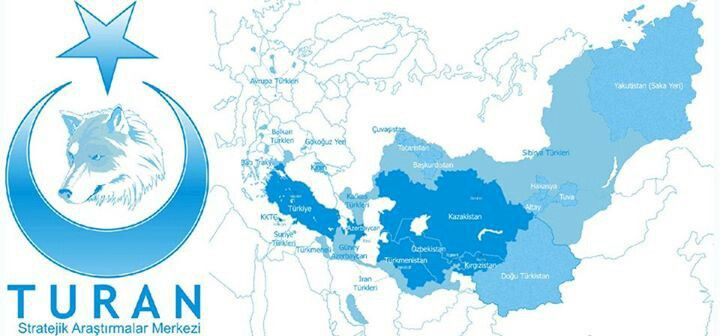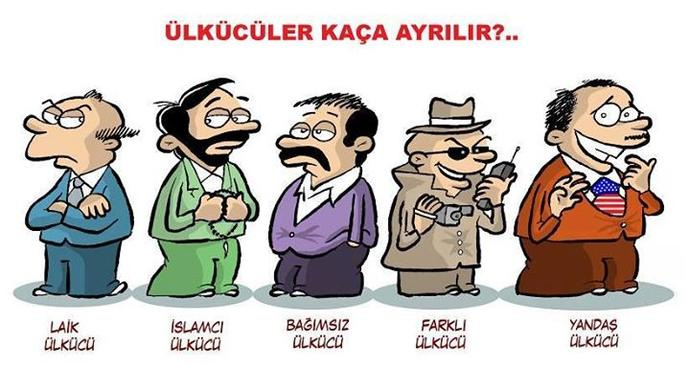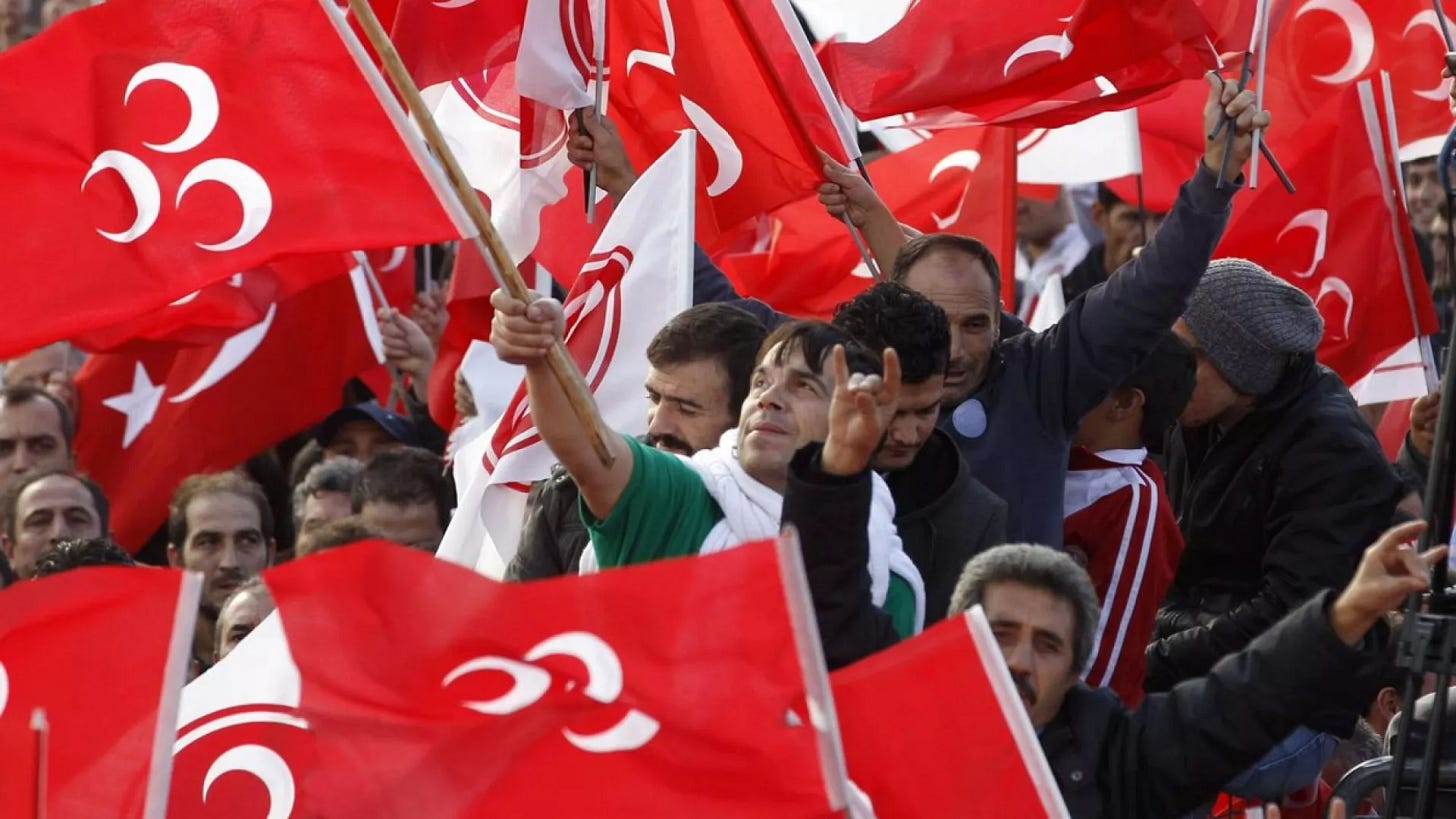Turkish nationalisms, Part. I
How would different concepts of the Turkish nation approach an outsider?
A few weeks ago,
, a reader of this blog, wrote me with a question:Can I invite you to ponder a particular problem I often encounter in the vocabulary of Turkish nationalism? I would love to know how you translate milliyetçi and ulusalcı into English. Is there an agreed way to differentiate between the two? How do you understand the difference? Take care and best wishes.
Both of these terms mean “nationalist,” but come from different political traditions. Upon further discussion on Substack’s DM function, Steve expanded on his question a bit:
I am a Brit who gained T.C. citizenship a few years ago. Someone recently told me that one difference between a milliyetçi and an ulusalcı is that the M would be happy to consider me one of the tribe (ne mutlu!) but the U would not. These are deep waters, I know, but I'd welcome your thoughts.
Let me first say that this is an excellent issue to be a bit confused about. There are a lot of different flavors of Turkish nationalism and no, there aren’t agreed-upon ways to distinguish between them. We’re also going through a time period when right-wing politics is particularly fluid, both at the base as well as in party-political levels.
I’d say all political groupings in Turkey are nationalists of some kind unless they’re explicitly anti-nationalist (leftists, Salafi Islamists), or nationalists of another nation (Kurdish nationalism comes to mind). Depending on the flavor of your nationalism, however, you’re a nationalist of a slightly different nation, meaning that you have a different conception of what the Turkish nation is.
I’m going to take Steve’s question as a bit of an excuse to cycle through some of these groups.
And the good news is that we don’t have to think about how to categorize the flavors of nationalism. Steve, (who agreed to be named by the way - I won’t name you unless you want me to) has provided us with a neat linguistic categorization: the terms “millet” and “ulus” are a good starting point, but I’ve taken the liberty to expand on them a bit. I divided the “millet” group into two, kept “ulus” as one, and added another bonus term as a third group (for paid subscribers).
I got a bit carried away a bit and ended up writing too much, so I split it up into two. You’ll get the next post in a day or two.
Let’s get started.
1. Millet
Note first that this is the general way to refer to any nation in Turkish. The United Nations, for example, is “Birleşmiş Milletler.”
“Millet” is also a colloquial way to just say “people.” So someone approaching a group of friends might say “naber millet?” meaning “how’s it going people?” and that’s generally devoid of any political subtext. It’s just how most people talk.
Those two usage cases are not relevant for our purposes. We’re concerned with a specifically political deployment of the term.
A bit of etymology is warranted here: “millet” comes from “millâh” in Aramaic and Hebrew, where it meant “word, speech, utterance.” As the term made its way into Arabic, it was used to describe a group bound by a religion. That makes sense to me. I picture the term’s meaning to evolve something like this across Semitic peoples:
word/speech —> linguistic group —> religious group
In the Ottoman system, the term “millet” referred to the various populations in the empire, mostly divided along religious lines. Muslims, Jews, Greek-Orthodox (Rûm), Armenians, Catholics, various forms of Syriacs, all made up different millet. They were allowed to have their own legal structures nestled into the overarching Ottoman rule. Scholars today refer to this as the “millet system.”
As the Ottoman Empire was declining, the Istanbul intelligentsia began to travel to Europe and adopt European ideas. As they wrote about their ideas, they often paired European concepts with their Ottoman cognates, even if it didn’t exactly fit. The writer Namık Kemal was famous for doing this. “Democracy,” for example, became “meşveret” in Turkish. To my knowledge, other terms like cumhuriyet (republic), hükümet (government), and even hürriyet (freedom) went through significant changes, leaving their Islamic heritage behind and sort of latched on to Western concepts. The idea was to find parts of Islamic tradition and read modern European politics into them, so that these concepts would seem more authentic.
As far as I know, that’s also when the Ottoman concept of “millet” shifted out of its previous meaning as a faith community and into its present meaning as a European-style “natio.” Note that I don’t read Ottoman and only know this stuff from secondary sources, so do verify.
To recap, the trajectory of “millet” now looked like this:
word/speech —> linguistic group —> religious group —> national group
Today, there are two major political traditions that use the word “millet” to describe the Turkish nation, but they conceptualize the thing they call the “Turkish millet” in significantly different ways.
1.1. Türkçü/Milliyetçi (Turkist/Nationalist)
Turkism is a broad church. There are the nationalists of the early Kemalists, as conceptualized by Ziya Gökalp. That’s a more European style of nationalism, but that strand has lost its edge in recent years, kind of dissolving in the social democratic tradition of the CHP.
When we talk about Turkism, or pan-Turkic nationalism today, we’re really talking about an ethnicity-based ideology most famously conceptualized by Nihal Atsız. These are the people doing wolf salutes and dreaming of a united “Turan,” the great unity of Turkic peoples from Central Asia to Eastern Europe.

There are several words to describe this group in Turkish.
“Milliyetçi” meaning “nationalist” (they hog this word a bit, which causes a lot of confusion because it suggests that others aren’t nationalistic)
“Türk milliyetçisi” meaning “Turkish nationalist”
“Türkçü” meaning “Turkist”
“Ülkücü” meaning “idealists”
“Turancı” meaning Turanist
The first couple of terms are a bit more general and the last two are a bit more specific, but not by much. They are all used interchangeably.
Note that I didn’t put the term “Grey Wolves” up there. People in Turkey will speak of the “bozkurt işareti” (grey wolf salute) or refer to female Turkists as “asena” (she-wolf) but people don’t really refer to individual Turkists as “bozkurt” or the group collectively as “bozkurtlar.” I’ve heard that being done in the past, but I guess it fell out of favor for some reason. Western outlets like to use “Grey Wolves” as a sort of ersatz translation of “Ülkücü,” probably because “idealists” sounds too vague and slightly positive. If you’re building a narrative about a far-right group, that feral term slots right in, so people like to use it.
In English-language literature, Turkists are also referred to as “ultranationalist” or “far-right” nationalists. I have problems with both terms. The first sounds too much like a children’s toy, and the second sets up Turkism as the Turkish far-right, precluding other forms of far-right nationalism. I suspect the confusion comes from projecting European forms onto Turkish politics without a 21st-century context. Popular culture in the West has equated far-right nationalism with scientific racism, and they think that Turkism kind of looks like scientific racism, so it must be “the fascism of Turkey.”
To be clear, there is a lot of overtly fascist stuff going on in Turkism. Irredentist maps? Check. Völkish romanticism? Check. Stiff-arm salutes? Check. Anti-left rancor? Check. Hierarchical student organizations that will crack your head open? Check. Ties to organized crime? Check. Overrepresentation in the military and police forces? Check.
The dominant form of Turkism has all of these things, except really scientific racism. There was some of that up until WWII, but with the defeat of the Nazi regime, scientific racism kind of lost its luster in Turkey. Some of the top Turanists were put on trial over their racism and anti-Kemalism. Since then, the Turkists have developed a more cultural idea of Turkishness.
I think scientific racism would be very difficult to maintain in Turkey anyway. The country is the descendant of a famously multi-ethnic empire. It’s very difficult to argue that someone from the Black Sea coast, with fair skin and blue eyes, is of the same genetic pool as Muslims in Xinjiang (East Turkistan) in China, or even the good people of the province of Osmaniye, roughly 80 percent of whom vote for Turkist candidates.
I can’t really go into a full-bodied definition of Turkism, but suffice it to say that this form of politics has evolved into many, many different directions in recent decades. Yes, there is that core group coming from the “idealist hearths,” but there’s also a pretty diverse class of intellectuals, low-level bureaucrats with vague Turkist commitments, there’s Eurasianists and Atlanticists, Liberals and anti-liberals, street-level thugs and Ivy league doctoral candidates. That’s why I shudder when someone speaks of the whole group simply as “ultranationalist.” It’s a category error.

I’d argue that the vague overarching idea that binds these people, however, is devotion to what they consider to be the spirit of Turkishness. It’s hard to define, but they see modern Turkish identity as bearing the imprints of a horse-riding warrior culture that originates from the Central Asian steppe. Turkishness here carries the bearing of masters, but has a down-to-earth quality. People aren’t born Turks, they become Turks, but they do so from a very young age. It has to be imprinted on their spirit with Türkü (folk songs) and the cadences of the Turkish language.
If you’re an emigre from the Balkans, the Caucasus, or Crimea, you grew up speaking a Turkic language and adjust easily to life among Turkish Turks, you either are already a part of the “millet,” or you can integrate and become a part of it.
So what about Steve’s case? My understanding is that he is from Britain, moved to Turkey, learned Turkish, and became a citizen. That means that Anglo-American culture is still his dominant form of being. He thinks and feels in that way. In places like the United States and the United Kingdom, people can be from the outside world and still be considered citizens and politically integrated into the greater whole. I don’t think Turkists would extend Turkishness in this way. It’s a more continental form of nationalism.
That’s not to say that Turkists would necessarily be discriminatory towards someone like Steve. The main enemy in Turkist lore are Kurds, since they refuse assimilation into Turkish identity, or Armenians, who have recently fought wars with the Azerbaijanis. Turkism hasn’t in recent years been as overtly anti-Western as Islamism. This is changing at the party-political level in recent years, as the MHP has aligned itself with the Erdoğan palace, but hasn’t changed as dramatically at the grassroots level. Turkist elites can also be much more open-minded than people think, and I know many who’d be pretty polite and friendly toward someone like Steve. I just don’t think that the Turkist notion of the Turkish “millet” would include him in a meaningful way.
1.2. Milli Görüş (National View) - Turkish Islamism
Islamism is often seen as being separate from nationalism. I don’t think this makes sense, at least not the kind of Islamism we’re talking about in mainstream Turkish politics. The people we call “Islamist” in Turkey, ideologues like Nurettin Topçu, Necip Fazıl, or Sadık Albayrak, aren’t pouring over the Quran and distilling its principles into laws for the present day. They are polemicists who build up a romantic notion of the Turkish nation. That’s why they’re also sometimes called “Anatolianists” (Anadolucu). at the party-political level, they are represented by the “Milli Görüş” (National View) movement of Necmettin Erbakan, and more recently by the AK Party and president Erdoğan.
So unless noted otherwise, on this blog:
Islamism = romantic (and often reactionary) nationalism using Islamic symbols
The Islamist conception of the “millet” however, is somehow different from the Turkist one. The emphasis here is on spiritual belonging to the nation. In that sense it’s a bit closer to the Ottoman meaning of “millet.” The Sunni-Turkic core of the country is the millet, but there are loose add-ons to the millet, like secular Kemalists or some non-Muslims.
In the Islamist mindset, the metaphysical core of the Turkish nation is its Islamic faith. That aspect really has to be at the core of the state, and it has to be the center of gravity in Turkey’s demographic makeup. The nation is therefore weakened when diluted with liberal, Westernized Turks. If you’re a liberal Turk with Western university degrees living in a fancy Istanbul neighborhood, you’ll be a “local gâvur” (yerli gâvur), a term originally used to describe Zoroastrians, and today roughly translates as “infidel.” It’s telling that Islamists have secularized this term and used it to mark someone who’s an enemy of the nation.
Aydın Ünal, a columnist at the Islamist newspaper Yeni Şafak, recently wrote a column that really lays out the difference between Islamist and Turkist conceptions of the nation. Here’s an excerpt:
Syrian guests are a balancing factor in our actual demographic structure. Don’t mind those who pretend to be Turks and Turkists and provoke people. Our Syrian guests stand by our side in the defense of Turkishness, and against Kurdish racism supported by terrorism, Iran’s Shiite expansionism, and assimilation under the name of Westernization. Not every Muslim is a Turk, but a Turk is a Turk if he is a Muslim. In the face of an atheist, Shamanist, Tengrist, [pre-Islamic Turkic religion] etc. who claims to be a Turk, a Muslim Syrian, like a Muslim Kurd, is much closer to us, much more like us, much more of our kind. Ask your conscience: If you had to choose between an atheist, Shamanist, or Tengrist who claims to be a Turk, whose heart is blackened, whose evil is ingrained in his cells, who is illiterate, and a Syrian who is honest and Muslim, whom would you choose? I am sure you will not have a hard time choosing, but if you still have a hard time, you can look at the Seljuks, the Ottomans, or examine the population exchanges in the Republican period.
The emphasis above is mine.
That kind of thinking is seldom articulated in Islamist media, simply because it’s not very popular, but it is there nonetheless at the highest levels of the state.
So I think that the Islamist conception of the “millet” is a bit more plastic. That is partly because Islam, which is a proselytizing religion, is still central to it. More importantly, though, is that Islamism has been in power for a long time and is saddled with the responsibilities of governing, and the way Turkey’s neoliberal economy is set up just demands demographic expansion. The country’s native population is falling fast and the economy can’t get more productive, so it needs to find cheap labor from somewhere. I think Yeni Şafak’s editorial line reflects those kinds of priorities.
I’d say that these factors make it more open to people like Steve, but with some caveats. If, for example, on top of having learned Turkish and become a citizen, Steve was also a convert to Islam and expressed support for President Erdoğan, he’d be considered fairly “millî,” certainly more so than an irreverent wretch like myself. He would also be considered “millî” if he professed another Abrahamic faith (any form of Christianity or Judaism) and/or expressed support for Erdoğan’s leadership. I can see how someone with, for example, a George Galloway type of anti-liberalism, who’s also learned Turkish and spent many years in the country, might be received more warmly among Islamists than among Turkists. Keep in mind that Islamists also make up the ruling caste now, which means that they tend to travel more internationally, and are thus more exposed to complicated identities.
If, however, Steve was secular and liberal, I think Islamists would be inclined to see him as part of the global liberal force they’re fighting against, and as such, an inherently un-milli presence, no matter what his citizenship.
That wraps up the first part. Stay tuned for “Ulusalcılık,” another way to conceptualize the Turkish nation.




